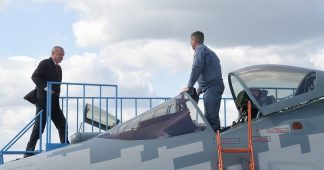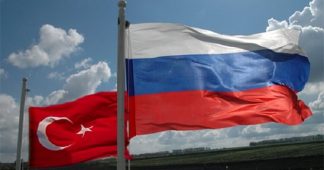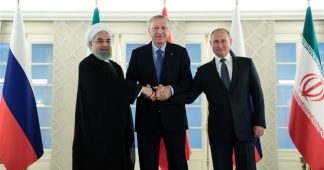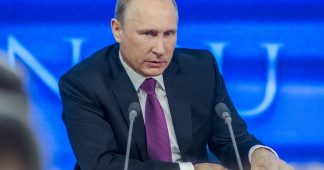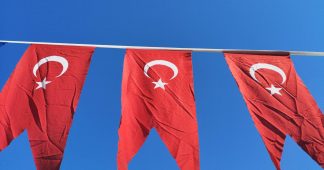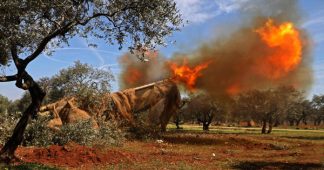By Alyona Zadorozhnaya
Turkey has closed its airspace to Russian planes flying to Syria. This decision concerns not only military, but also civil aviation. What prompted Ankara to take such a step, how is it related to the events in Ukraine and how will such a decision affect the supply of the Russian group in Syria?
Turkish airspace is closed for Russian planes flying to Syria. This was announced yesterday by Foreign Minister Mevlut Cavusoglu. According to him, President Tayyip Erdogan warned his Russian counterpart Vladimir Putin about this. The diplomat also noted that Ankara “is negotiating with the Russian Federation through dialogue, the implementation of the Montreux Convention, as well as through other issues.”
At the same time, Turkey still refuses to impose sanctions against Moscow against the background of a special military operation in Ukraine. Cavusoglu claims that in this regard, Russian companies can continue to do business in Turkey, while respecting local legislation and international law.
Turkey has stated its readiness to follow the Montreux Convention before. At the same time, Cavusoglu noted that the country will not be able to ignore the sanctions if such a decision is made by the UN. In addition, Turkey has repeatedly confirmed its desire to take a direct part in resolving the crisis in Ukraine.
Among other things, Ankara offered Istanbul as a venue for negotiations on a peaceful settlement of the situation. At the same time, after two rounds of negotiations, Russian President Vladimir Putin said that Minsk should be considered as the main negotiating platform.
Against this background, Erdogan announced talks with the presidents of Russia and Ukraine. On Sunday, a telephone conversation with Vladimir Zelensky has already taken place. In the conversation, Erdogan declared his readiness to act as a guarantor of Ukraine’s security. He also stressed the need to evacuate the wounded and civilians from Mariupol. It should be noted that against the background of Erdogan’s peacekeeping initiatives, Turkey continues to actively supply weapons to Ukraine, including Bayraktar drones.
According to experts, Turkey’s decision will not have a critical impact on the supply of the Russian group in Syria. However, such a step has obvious political meaning and can be interpreted as Erdogan’s dissatisfaction with the fact that Moscow de facto refused to hold talks with representatives of Ukraine in Istanbul, choosing Minsk for this.
“Turkey is trying to counteract Russia, but in such a way that Moscow is not offended. Ankara, for example, does not like the improvement of the situation in Syria, as well as the strengthening of Damascus’ positions in the region. This is an attempt to shackle Russia’s actions in different theaters of military and political actions and support Zelensky,” the associate professor of the Department of Political Science and Sociology of the Russian University of Economics told the newspaper VIEW. Plekhanova, member of the expert council of “Officers of Russia” Alexander Perendzhiev.
“On the other hand, Ankara is trying to act as an independent player and increases its own geopolitical role.
Turkey is pursuing its own interests in Ukraine. And, apparently, they run counter to the interests of the United States and NATO. For us, Turkey has never been a reliable partner, the balance in our relations is contradictory, and only in economic matters does Erdogan act with benefit for everyone,” Perendzhiev is sure.
Konstantin Sivkov, Doctor of Military Sciences, admits that Turkey’s actions will affect the interaction between Moscow and Damascus. “In fact, this is a hidden form of imposing sanctions against Moscow, although Ankara officially declares that it does not intend to resort to restrictions,” Sivkov told the VZGLYAD newspaper.
The interlocutor is also sure that these restrictions are “a serious threat to Russia’s security.” “Now the only air route to Syria that we have left is Iran. Our aviation will have to make a certain detour, spend more fuel and more time. This complicates the solution of problems in the region,” Sivkov explained.
At the same time, the Director General of the Russian International Affairs Council, Andrey Kortunov, does not expect any serious consequences as a result of Ankara’s decisions, although such a step cannot be called friendly. “Russia and Turkey have a number of fundamental differences on Syria. We are talking about the future of Idlib and the situation in the Kurdish areas. All this can aggravate the contradictions between us,” the interlocutor explained.
Kortunov also drew attention to the fact that Turkey still adheres to the Montreux Convention, not allowing ships of other countries to enter the Black Sea. “Turkey is trying to pursue its own policy. It is obvious that these decisions do not affect Russia so much, but at the same time they directly affect it,” Kortunov added.
In turn, orientalist Kirill Semenov believes that Turkey has taken such a step, “for which Russia will not even be able to reproach it.” “The NATO country provided military supplies to a state hostile to NATO and did not break the contract, but fulfilled it to the end, but simply did not extend it,” the expert notes.
But Turkey can use such a step as an argument in response to the claims of the United States and other NATO allies, who accuse Ankara of insufficient efforts to isolate Russia.
“Here [she] kind of did it, despite the fact that it has nothing to do with the events in Ukraine,” he added. Semenov also believes that Turkey’s decision “is not a big problem” for Russia, “since the bulk of the cargo needed for the Russian grouping is delivered by civilian sea vessels, for which the Black Sea Straits are still open.”
“Personnel and even entire units with weapons can still arrive in Syria through the airspace of Iran and Iraq. And in the event of a military threat, large contingents of troops can be deployed there in the same way, following the example of how the Russian grouping was deployed in Kazakhstan within the framework of the CSTO in January,” Semenov concluded.
We remind our readers that publication of articles on our site does not mean that we agree with what is written. Our policy is to publish anything which we consider of interest, so as to assist our readers in forming their opinions. Sometimes we even publish articles with which we totally disagree, since we believe it is important for our readers to be informed on as wide a spectrum of views as possible.
